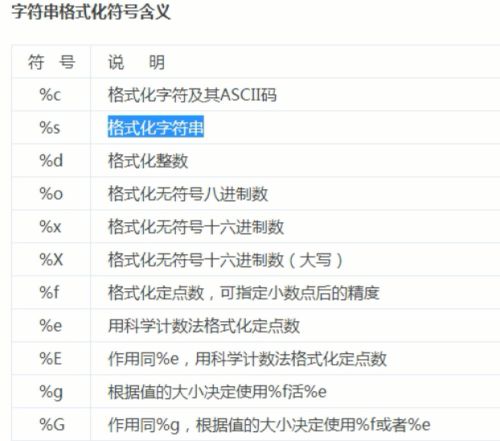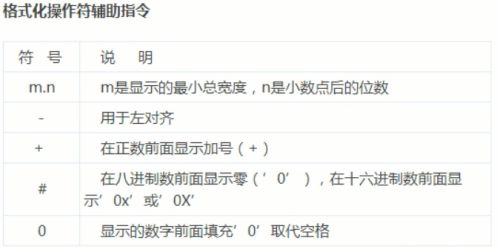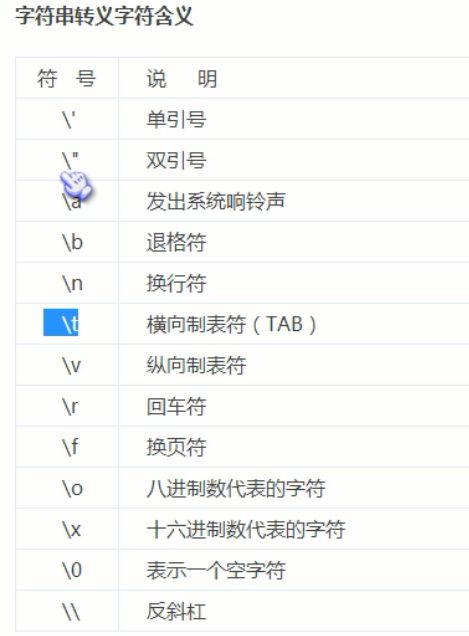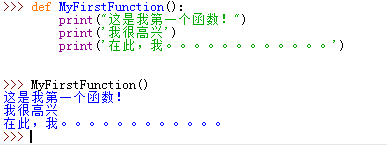字符串:格式化
>>> "{0} love {1}.{2}" .format("I","pyton","com")
'I love pyton.com'
>>>
>>> "{a} love {b}.{c}" .format(a='I',b='python',c='com')
'I love python.com'
>>> "{0} love {b}.{c}" .format('I',b='python',c='com')
'I love python.com'
>>>
>>> "{a} love {b}.{0}" .format(a='I',b='python','com')
SyntaxError: positional argument follows keyword argument
>>>
>>> print('\ta')
a
>>> print ('\\')
\
>>> "`0`" .format("不打印")
'{0}'
>>> '{0:.1f}{1}'.format(27.658,'GB')
'27.7GB'
>>>
>>> '%c' % 97
'a'
>>> '%c %c %c' % (97,98,99)
'a b c'
>>> '%s' % 'I love Python'
'I love Python'
>>> '%d + %d = %d' %(4,5,4+5)
'4 + 5 = 9'
>>> '%o' % 10
'12'
>>> '%x' % 10
'a'
>>> '%X' % 10
'A'
>>> '%f' % 27.658
'27.658000'
>>> '%e' % 27.658
'2.765800e+01'
>>> '%E' % 27.658
'2.765800E+01'
>>> '%G' % 27.658
'27.658'
>>>
>>> '%f' % 27.658
'27.658000'
>>> '%e' % 27.658
'2.765800e+01'
>>> '%E' % 27.658
'2.765800E+01'
>>> '%G' % 27.658
'27.658'
>>> '%5.1f' % 27.658
' 27.7'
>>> '%.2e' % 27.658
'2.77e+01'
>>> '%10d' % 5
' 5'
>>> '%-10d' % 5
'5 '
>>> '%+10d' % 5
' +5'
>>>
>>> '%#o' % 10
'0o12'
>>> '%#X' % 108
'0X6C'
>>> '%#d' % 10
'10'
>>> '%010d' %5
'0000000005'
>>> '%-010d' %5
'5 '
>>>
序列!序列!
列表、元组和字符串的共同点
都可以通过索引得到每一个元素
默认索引值总是从0开始
可以通过分片的方法得到一个范围内的元素的集合
有很多共同的操作符(重复操作符、拼接操作符、成员关系操作符)
>>> help(list)
Help on class list in module builtins:
class list(object)
| list() -> new empty list
| list(iterable) -> new list initialized from iterable's items
|
| Methods defined here:
|
| __add__(self, value, /)
| Return self+value.
|
| __contains__(self, key, /)
| Return key in self.
|
| __delitem__(self, key, /)
| Delete self[key].
|
| __eq__(self, value, /)
| Return self==value.
|
| __ge__(self, value, /)
| Return self>=value.
|
| __getattribute__(self, name, /)
| Return getattr(self, name).
|
| __getitem__(...)
| x.__getitem__(y) <==> x[y]
|
| __gt__(self, value, /)
| Return self>value.
|
| __iadd__(self, value, /)
| Implement self+=value.
|
| __imul__(self, value, /)
| Implement self*=value.
|
| __init__(self, /, *args, **kwargs)
| Initialize self. See help(type(self)) for accurate signature.
|
| __iter__(self, /)
| Implement iter(self).
|
| __le__(self, value, /)
| Return self<=value.
|
| __len__(self, /)
| Return len(self).
|
| __lt__(self, value, /)
| Return self
|
| __mul__(self, value, /)
| Return self*value.n
|
| __ne__(self, value, /)
| Return self!=value.
|
| __new__(*args, **kwargs) from builtins.type
| Create and return a new object. See help(type) for accurate signature.
|
| __repr__(self, /)
| Return repr(self).
|
| __reversed__(...)
| L.__reversed__() -- return a reverse iterator over the list
|
| __rmul__(self, value, /)
| Return self*value.
|
| __setitem__(self, key, value, /)
| Set self[key] to value.
|
| __sizeof__(...)
| L.__sizeof__() -- size of L in memory, in bytes
|
| append(...)
| L.append(object) -> None -- append object to end
|
| clear(...)
| L.clear() -> None -- remove all items from L
|
| copy(...)
| L.copy() -> list -- a shallow copy of L
|
| count(...)
| L.count(value) -> integer -- return number of occurrences of value
|
| extend(...)
| L.extend(iterable) -> None -- extend list by appending elements from the iterable
|
| index(...)
| L.index(value, [start, [stop]]) -> integer -- return first index of value.
| Raises ValueError if the value is not present.
|
| insert(...)
| L.insert(index, object) -- insert object before index
|
| pop(...)
| L.pop([index]) -> item -- remove and return item at index (default last).
| Raises IndexError if list is empty or index is out of range.
|
| remove(...)
| L.remove(value) -> None -- remove first occurrence of value.
| Raises ValueError if the value is not present.
|
| reverse(...)
| L.reverse() -- reverse *IN PLACE*
|
| sort(...)
| L.sort(key=None, reverse=False) -> None -- stable sort *IN PLACE*
|
| ----------------------------------------------------------------------
| Data and other attributes defined here:
|
| __hash__ = None
>>>
迭代是重复反馈过程活动,其目的通常是为了接近达到所需的目标或结果。
>>> a = list()
>>> a
[]
>>> b = 'I love Pyton'
>>> b = list(b)
>>> b
['I', ' ', 'l', 'o', 'v', 'e', ' ', 'P', 'y', 't', 'o', 'n']
>>>
>>> c = (1,1,2,3,5,8,13,21,34)
>>> c = list(c)
>>> c
[1, 1, 2, 3, 5, 8, 13, 21, 34]
>>>
Tuple([iterable])把一个可迭代对象转换为元组
>>> help(tuple)
Help on class tuple in module builtins:
class tuple(object)
| tuple() -> empty tuple
| tuple(iterable) -> tuple initialized from iterable's items
|
| If the argument is a tuple, the return value is the same object.
|
| Methods defined here:
|
| __add__(self, value, /)
| Return self+value.
|
| __contains__(self, key, /)
| Return key in self.
|
| __eq__(self, value, /)
| Return self==value.
|
| __ge__(self, value, /)
| Return self>=value.
|
| __getattribute__(self, name, /)
| Return getattr(self, name).
|
| __getitem__(self, key, /)
| Return self[key].
|
| __getnewargs__(...)
|
| __gt__(self, value, /)
| Return self>value.
|
| __hash__(self, /)
| Return hash(self).
|
| __iter__(self, /)
| Implement iter(self).
|
| __le__(self, value, /)
| Return self<=value.
|
| __len__(self, /)
| Return len(self).
|
| __lt__(self, value, /)
| Return self
|
| __mul__(self, value, /)
| Return self*value.n
|
| __ne__(self, value, /)
| Return self!=value.
|
| __new__(*args, **kwargs) from builtins.type
| Create and return a new object. See help(type) for accurate signature.
|
| __repr__(self, /)
| Return repr(self).
|
| __rmul__(self, value, /)
| Return self*value.
|
| count(...)
| T.count(value) -> integer -- return number of occurrences of value
|
| index(...)
| T.index(value, [start, [stop]]) -> integer -- return first index of value.
| Raises ValueError if the value is not present.
>>>
Str(obj)把obj对象转换为字符串
>>> len(a)
0
>>> len(b)
12
>>> b
['I', ' ', 'l', 'o', 'v', 'e', ' ', 'P', 'y', 't', 'o', 'n']
max()返回序列或者参数集合中的最大值
>>> max(1,2,3,4,5)
5
>>> max(b)
'y'
>>> numbers = [1,18,13,0,-98,34,67,89,32]
>>> max(numbers)
89
>>>
min()返回序列或者参数集合中的最小值
>>> min(numbers)
-98
>>> chars = '1234567890'
>>> min(chars)
'0'
>>> tuple1 = (1,2,3,4,5,6,7,8,9,0)
>>> min(tuple1)
0
>>>
sum(iterable[,start=0])返回序列iterable和可选参数start的总和
>>> tuple2 = (3,1,2,3,3,4)
>>> sum(tuple2)
16
>>> sum(tuple2,4)
20
>>>
>>> chars
'1234567890'
>>> sum(chars)
Traceback (most recent call last):
File "
sum(chars)
TypeError: unsupported operand type(s) for +: 'int' and 'str'
>>>
>>> sorted(numbers)
[-98, 0, 1, 13, 18, 32, 34, 67, 89]
>>> reversed(numbers)
>>> list(reversed(numbers))
[32, 89, 67, 34, -98, 0, 13, 18, 1]
>>> enumerate(numbers)
>>> list(enumerate(numbers))
[(0, 1), (1, 18), (2, 13), (3, 0), (4, -98), (5, 34), (6, 67), (7, 89), (8, 32)]
>>> a = [1,2,3,4,5,6,7,8]
>>> b = [4,5,6,7,8]
>>> zip (a,b)
>>> list(zip(a,b))
[(1, 4), (2, 5), (3, 6), (4, 7), (5, 8)]
>>>
函数:Python的乐高积木
函数
对象
模块
>>> def MySecondFunction(name):
print(name + '我爱你')
>>> MySecondFunction('jm')
jm我爱你
>>> MySecondFunction('j')
j我爱你
>>> def add(num1 , num2):
result = num1 + num2
print(result)
>>> def add(num1 , num2):
result = num1 + num2
print(result)
>>> add(1 , 2)
3
>>> def add(num1 , num2):
return (num1 + num2)
>>> print (add(5 , 6))
11
>>> print (11)
11
>>>
形参和实参
>>> def MyFirstFunction(name):
'函数定义过程中的name是叫形参'
#因为Ta只是一个形式,表示占据一个参数位置
print('传递进来的' + name + '叫做实参,因为Ta是具体的参数值!')
>>> MyFirstFunction('jm')
传递进来的jm叫做实参,因为Ta是具体的参数值!
形式参数(parameter) 实际参数(argument)
函数文档
>>> def MyFirstFunction(name):
'函数定义过程中的name是叫形参'
#因为Ta只是一个形式,表示占据一个参数位置
print('传递进来的' + name + '叫做实参,因为Ta是具体的参数值!')
>>> MyFirstFunction('jm')
传递进来的jm叫做实参,因为Ta是具体的参数值!
>>> MyFirstFunction.__doc__
'函数定义过程中的name是叫形参'
>>>
>>> help(MyFirstFunction)
Help on function MyFirstFunction in module __main__:
MyFirstFunction(name)
函数定义过程中的name是叫形参
>>> print .__doc__
"print(value, ..., sep=' ', end='\\n', file=sys.stdout, flush=False)\n\nPrints the values to a stream, or to sys.stdout by default.\nOptional keyword arguments:\nfile: a file-like object (stream); defaults to the current sys.stdout.\nsep: string inserted between values, default a space.\nend: string appended after the last value, default a newline.\nflush: whether to forcibly flush the stream."
>>> help(print)
Help on built-in function print in module builtins:
print(...)
print(value, ..., sep=' ', end='\n', file=sys.stdout, flush=False)
Prints the values to a stream, or to sys.stdout by default.
Optional keyword arguments:
file: a file-like object (stream); defaults to the current sys.stdout.
sep: string inserted between values, default a space.
end: string appended after the last value, default a newline.
flush: whether to forcibly flush the stream.
>>>
关键字参数
>>> def SaySome(name , words):
print(name + '->' + words)
>>> SaySome('jm','让编程改变世界!')
jm->让编程改变世界!
>>> SaySome('让编程改变世界!','jm')
让编程改变世界!->jm
>>> SaySome(words='让编程改变世界!',name='jm')
jm->让编程改变世界!
>>>
默认参数
>>> def SaySome(name='jm',words='让编程改变世界!'):
print(name + '->' + words)
>>> SaySome()
jm->让编程改变世界!
>>> SaySome('j')
j->让编程改变世界!
>>> SaySome('j','m')
j->m
>>>
收集参数
>>> def test(*params):
print('参数的长度是:',len(params));
print('第二参数是:',params[1]);
>>> test(1,'jm',3,14,5,6,7,8,9)
参数的长度是: 9
第二参数是: jm
>>>
>>> def test(*params,exp):
print('参数的长度是:',len(params),exp);
print('第二参数是:',params[1]);
>>> test(1,'jm',3,14,5,6,7,8,9)
Traceback (most recent call last):
File "
test(1,'jm',3,14,5,6,7,8,9)
TypeError: test() missing 1 required keyword-only argument: 'exp'
>>> test(1,'jm',3,14,5,6,7,8,exp = 9)
参数的长度是: 8 9
第二参数是: jm
>>>
函数与过程
>> def hello():
print("Hello python")
>>> temp = hello()
Hello python
>>> temp
>>>
>>> print(temp)
None
>>>
>>> type(temp)
>>>
再谈谈返回值
>>> def back():
return [1,'a',3.14]
>>> back()
[1, 'a', 3.14]
>>> def back():
return 1,'a',3.14
>>> back()
(1, 'a', 3.14)
>>>
我的地盘听我的
def discounts(price, rate):
final_price = price * rate
old_price = 88 #这里试图修改全局变量
print('修改后old_price的值是:', old_price)
return final_price
old_price = float(input('请输入原价:'))
rate = float(input('请输入折扣率:'))
new_price = discounts(old_price, rate)
print('修改后old_price的值是:', old_price)
print('打折后价格是:', new_price)
函数:内嵌函数和闭包
>>> count = 5
>>> def MyFun():
count = 10
print(10)
>>> MyFun()
10
>>> print (count)
5
>>>
>>> def MyFun():
global count
count = 10
print (10)
>>> MyFun()
10
>>> print(count)
10
>>>
内嵌函数
>>> def fun1():
print('fun1()正在被调用...')
def fun2():
print('fun2()正在被调用...')
fun2()
>>> fun1()
fun1()正在被调用...
fun2()正在被调用...
>>>
闭包
>>> def FunX(x):
def FunY(y):
return x * y
return FunY
>>> i=FunX(8)
>>> i
>>> type(i)
>>> i(5)
40
>>> FunX(8)(5)
40
>>>
>>> FunY(5)
Traceback (most recent call last):
File "
FunY(5)
NameError: name 'FunY' is not defined
>>>
>>> def Fun1():
x=5
def Fun2():
x *= x
return x
return Fun2()
>>> Fun1()
Traceback (most recent call last):
File "
Fun1()
File "
return Fun2()
File "
x *= x
UnboundLocalError: local variable 'x' referenced before assignment
>>>
>>> def Fun1():
x = [5]
def Fun2():
x[0] *= x[0]
return x[0]
return Fun2()
>>> Fun1()
25
>>>
>>> def Fun1():
x = 5
def Fun2():
nonlocal x
x *= x
return x
return Fun2()
>>> Fun1()
25
>>>
函数:lambda表达式
>>> def ds(x):
return 2* x + 1
>>> ds(5)
11
>>> lambda x : 2 * x + 1
>>> g = lambda x : 2 * x + 1
>>> g(5)
11
>>> def add(x,y):
return x + y
>>> add(3,4)
7
>>> lambda x , y : x + y
>>> g = lambda x , y : x + y
>>> g(3 , 4)
7
>>>
l Python写一些执行脚本时,使用lambda就可以省下定义函数过程,比如说我们只是需要写个简单的脚本来管理服务器时间,我们就不需要专门定义一个函数然后再写调用,使用lambda就可以使得代码更加精简。
l 对于一些比较抽象并且整个程序执行下来只需要调用一两次的函数,有时候给函数起个名字也是比较头疼的问题,使用lambda就不需要考虑命名的问题了。
l 简化代码的可读性,由于普通的屌丝函数阅读经常要跳到开头def定义部分,使用lambda函数可以省去这样的步骤。
两个牛逼的BIF
>>> help(filter)
Help on class filter in module builtins:
class filter(object)
| filter(function or None, iterable) --> filter object
|
| Return an iterator yielding those items of iterable for which function(item)
| is true. If function is None, return the items that are true.
|
| Methods defined here:
|
| __getattribute__(self, name, /)
| Return getattr(self, name).
|
| __iter__(self, /)
| Implement iter(self).
|
| __new__(*args, **kwargs) from builtins.type
| Create and return a new object. See help(type) for accurate signature.
|
| __next__(self, /)
| Implement next(self).
|
| __reduce__(...)
| Return state information for pickling.
>>> filter(None,[1,0,False,True])
>>> list(filter(None,[1,0,False,True]))
[1, True]
>>> def odd(x):
return x % 2
>>> temp = range(10)
>>> show = filter(odd,temp)
>>> list(show)
[1, 3, 5, 7, 9]
>>> list(filter(lambda x : x % 2, range(10)))
[1, 3, 5, 7, 9]
>>>
>>> list(map(lambda x : x * 2, range(10)))
[0, 2, 4, 6, 8, 10, 12, 14, 16, 18]
>>>



